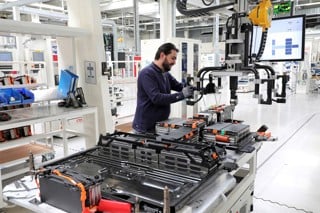By Paul Holland, managing director for UK Fuel at Fleetcor
Electrification of fleets, either through hybrid, battery or hydrogen powertrains, offers businesses and the public the opportunity to reduce their carbon and pollutant footprints.
This is something that we know we must achieve, but the goal of a zero-emission future is not simple.
For businesses, the transition is marred by political and technical pitfalls, and the potential for ill-informed decision making could have significant impacts in terms of operations, employee engagement and profitability.
The move to alternative fuels
There is still much to be done to facilitate the move to alternative fuels (AF), such as ensuring the infrastructure is as ubiquitous as that of traditional fuels.
This is because there are still concerns about range and ability to refuel sufficiently.
Issues over total cost of ownership, such as purchase, tax position, long-term maintenance and defleeting - is also leading to caution among fleets about investment in AF.
Similarly, uncertainty about which AF to invest in is also leading fleet operators to tread carefully when transitioning their fleet.
Despite these concerns, new insight from Allstar Business Solutions found that over one in four (27%) large businesses are planning to add electric vehicles (EV) and other AF vehicles to their fleets by 2021.
And by doing so, there clearly is a future for low emission, low cost, highly efficient transport for employees, goods and services.
What can be done to combat these concerns?
With less certainty around future values and service, maintenance and repair (SMR) costs, fleet operators should avoid outright purchasing the vehicles. Instead, look to fund them through alternative procurement routes, such as contract hire or new finance lease options where the customer has more say over SMR work and shares the profit (or loss) the vehicle makes at resale with the leasing company.
Additionally, when it comes to the current infrastructure available to support AF, it will be challenging for businesses to ensure seamless operations – particularly those that rely on vehicles for long distance trips and deliveries.
There are, however, resources available to businesses which will help them map the available AF infrastructure both locally and nationally.
This analysis will help businesses plot the viability of AF for their operations.
That being said, traditional fuels are not going anywhere anytime soon and the majority of vehicles – in particular HGVs and higher mileage cars and vans – are set to be powered by diesel or petrol for the foreseeable future.
It is still important that businesses are provided access to fuel (whether traditional or alternative) to ensure their fleets are able to travel as conveniently as possible.
We need to remain committed to keeping Britain’s commercial vehicles on the road but also look to future and play our part to serve both the UK economy and environment.




















Login to comment
Comments
No comments have been made yet.